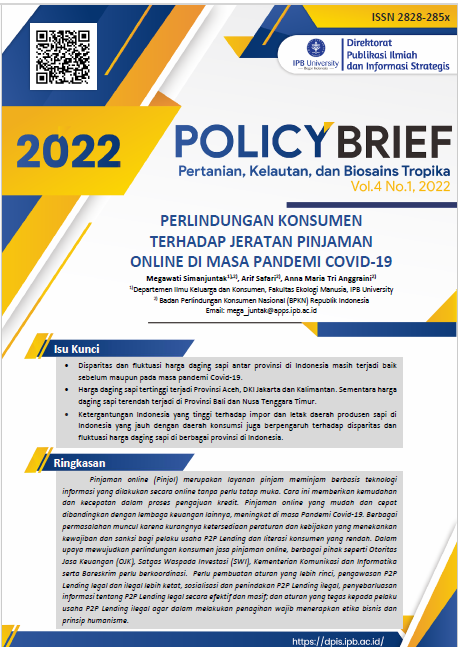
Date Log
Perlindungan Konsumen Terhadap Jeratan Pinjaman Online di Masa Pandemi Covid 19
Corresponding Author(s) : Megawati Simanjuntak
Policy Brief Pertanian, Kelautan, dan Biosains Tropika,
Vol. 4 No. 1 (2022): Policy Brief Pertanian, Kelautan dan Biosains Tropika
Abstract
Pinjaman online (Pinjol) merupakan layanan pinjam meminjam berbasis teknologi informasi yang dilakukan secara online tanpa perlu tatap muka. Cara ini memberikan kemudahan dan kecepatan dalam proses pengajuan kredit. Pinjaman online yang mudah dan cepat dibandingkan dengan lembaga keuangan lainnya, menin gkat di masa Pandemi Covid 19. Berbagai permasalahan muncul karena kurangnya ketersediaan peraturan dan kebijakan yang menekankan kewajiban dan sanksi bagi pelaku usaha P2P Lending dan literasi konsumen yang rendah. Dalam upaya mewujudkan perlindungan konsumen jasa pinjaman online, berbagai pihak seperti Otoritas Jasa Keuangan (OJK), Satgas Waspada Investasi (SWI), Kementerian Komunikasi dan Informatika serta Bareskrim perlu berkoordinasi. Perlu pembuatan aturan yang lebih rinci, pengawasan P2P Lending legal dan ilegal lebih ketat, sosialisasi dan penindakan P2P Lending ilegal, penyebarluasan informasi tentang P2P Lending legal secara efektif dan masif; dan aturan yang tegas kepada pelaku usaha P2P Lending ilegal agar dalam melakukan penagihan wajib menerap kan etika bisnis dan prinsip humanisme.
Keywords
Download Citation
Endnote/Zotero/Mendeley (RIS)BibTeX
How to Cite
Alsop, R., & Heinsohn, N. (2005). Measuring Empowerment in Practice: Structuring Analysis and Framing Indicators. World Bank Policy Research Working Paper 3510.https://doi.org/10.1596/1813-9450-3510
Ayscue, E. P., Boley, B. B., Maruyama, N., & Woosnam, K. M. (2016). Testing for gender discrepancies using the Resident Empowerment through Tourism Scale.
Batson, C. D., Ahmad, N., & Tsang, J. (2002). Four motives for community involvement. Journal of Social Issues. 58(3), 429-445.
https://doi.org/10.1111/1540-4560.00269
Blanke, J., & Chiesa, T. (2013). The travel & tourism competitiveness report 2013: reducing barriers to economic growth and job creation. World Economic Forum.
Cao, X. (2015). Challenges and potential improvements in the policy and regulatory framework for sustainable tourism planning in China: The case of Shanxi Province. Journal of Sustainable Tourism. 23(3), 455-476. https://doi.org/10.1080/09669582.2014.957207
Carson, D. A., Carson, D. B., & Hodge, H. (2014). Understanding local innovation systems in peripheral tourism destinations. Tourism Geographies. 16(3): 457-473. https://doi.org/10.1080/14616688.2013.868030.
Cole, S. (2007). Beyond authenticity and commodification. Annals of Tourism Research. 34(4): 943-960. https://doi.org/doi:10.1016/j.annals.2007.05.004
Dolezal, C. (2015). Questioning empowerment in community-based tourism in rural Bali: Vol. Doctor of. the University of Brighton.
Forshee, J. (2006). Culture and Customs of Indonesia. Greenwood Publishing Group.
Giampiccoli, A., & Hayward Kalis, J. (2012). Community-based tourism and local culture: the case of the amaMpondo.
https://doi.org/10.25145/j.pasos.2012.10.017
Knight, D. W., & Cottrell, S. P. (2016). Evaluating tourism-linked empowerment in Cuzco, Peru. Annals of Tourism Research. 56: 32-47. https://doi.org/http://dx.doi.org/10.1016/j.annals.2015.11.007
Macbeth, J., Carson, D., & Northcote, J. (2008). Social capital, tourism and regional development: SPCC as a basis for innovation and sustainability. Current Issues in Tourism. 7(6): 502-522. https://doi.org/10.1080/1368350050408668200
Maruyama, N. U., Woosnam, K. M., & Boley, B. B. (2016). Residents' attitudes toward ethnic neighborhood tourism (ENT): perspectives of ethnicity and empowerment. Tourism Geographies: 1-22. https://doi.org/10.1080/14616688.2016.1258432 https://doi.org/10.1080/14616688.2016.1258432
Mehring, M., Seeberg-Elverfeldt, C., Koch, S., Barkmann, J., Schwarze, S., & Stoll-Kleemann, S. (2011). Local institutions: Regulation and valuation of forest use-Evidence from Central Sulawesi, Indonesia. Land Use Policy. 28(4): 736-747. https://doi.org/http://dx.doi.org/10.1016/j.landusepol.2011.01.001
Moscardo, G., Schurmann, A., Konovalov, E., & McGehee, N. G. (2013). Using tourism to build social capital in communities: New pathways to sustainable tourism futures.
Rachmawati, E. (2018). Tourism and community empowerment: Critical insights from Indonesia [Lincoln University].http://researcharchive.lincoln.ac.nz/handle/10182/11036
Reisinger, Y., & Turner, L. W. (2003). Cross-Cultural Behaviour in Tourism: Concepts and Analysis. Elsevier.
Scheyvens, R., & Scheyvens, R. (2015). Ecotourism and the Empowerment of Local Communities Ecotourism and the empowerment of local communities. Tourism Management.
Timothy, D. J. (2007). Empowerment and Stakeholder Participation in Tourism Destination Communities. In A. C. and T. Coles (Ed.), Tourism, power and space (pp. 199-216). Routledge.
Walpole, M. J., & Goodwin, H. J. (2000). Local economic impacts of dragon tourism in Indonesia. Annals of Tourism Research. 27(3): 559-576. https://doi.org/http://dx.doi.org/10.1016/S0160-7383(99)00088-2